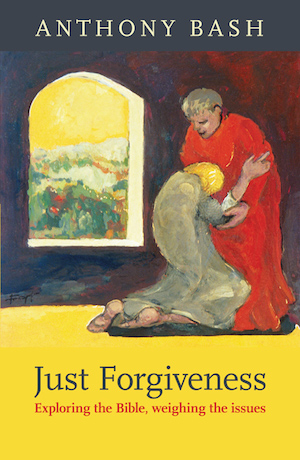How can forgiveness be just? How can you maintain that an action was utterly wicked, and then simply forgive, as if it didn’t matter?
These are the kinds of questions Anthony Bash explores, from a Christian perspective, in his 2011 book, Just Forgiveness (SPCK).
The book covers (it seems) much the same ground as Bash’s 2007 book, Forgiveness and Christian Ethics (Cambridge University Press), but in a more accessible format. It is thought-provoking and clearly written, though somewhat unstructured.
Forgiveness, according to Bash, ranges from ‘thin’ to ‘thick’. Forgiveness in its thinnest form would be simply a matter of forswearing resentment. Bash is keen to emphasise that this is forgiveness. But, ideally, there should be much more to it. Forgiveness, then, in its thickest form would have the characteristics of what Bash terms the ‘forgiveness quintet’:
True forgiveness takes account of justice in the context of
- a deliberate and direct response
- to a wrongdoer’s repentance
- about a morally reprehensible act
- that can lead to a restored relationship (34).
Biblically, forgiveness always presupposes repentance:
when Jesus spoke about the duty of men and women to forgive, people believed repentance to be an indispensable precondition of God forgiving human sin. There is no reason to think that Jesus would have expected human beings to be more generous in their forgiveness than God, and so to forgive without the wrongdoer first being repentant (78).
Of course, we should never be vengeful or harbour bitterness, and we should always be open to the possibility of forgiveness. But there is no obligation to forgive in the absence of repentance. In most cases, one would be free to forgive, even in the absence of repentance, but in some cases, to forgive could be ‘morally wrong’ (77):
For example, if to forgive would leave the wrongdoer thinking that we thought the act was not wrong or where the forgiveness would leave the wrongdoer free to harm another person in the same way (151n11).
This has obvious relevance for cases of ongoing abuse.
Finally, what about justice? Divine-human forgiveness can be just, because of the atoning work of Christ on the cross, and because of the anticipated righting of wrongs in the messianic age. However, person-to-person forgiveness can never be entirely just, even when there is repentance and restitution, because the wrongdoing itself cannot be undone (16, 27, 141, 143-4).
[Repentance] can, however, undo the relational effects of the wrongdoing and restore victim and wrongdoer to something approximating to their original position (144). … Forgiveness, offered in such a situation, can be loving and (more or less) just (144).
